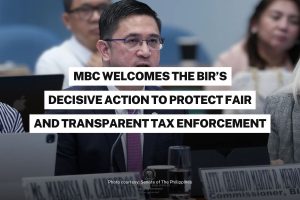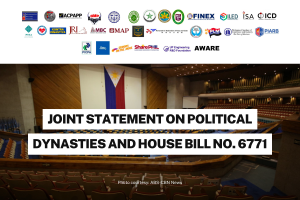Statement on the Case of Duterte V. House of Representatives G.R. No. 278353, July 25, 2025
15 August 2025 – We join a nation hopeful that the Supreme Court shall steadfastly resume its role in defending the Constitution that the Filipino people have ratified at a pivotal time in our history.
With much respect to the Court, we add to the voices of our nation’s luminaries and set forth our observations on why the decision in Duterte v. HOR merits reconsideration.
- “Deemed Initiated” is not in the Constitution. The Court treated the first three complaints as “deemed dismissed” triggering the one-year bar for the initiation of the next impeachment. The Court, in effect, treated the first three complaints (counted as one) as “deemed initiated” as well. For how can there be a succeeding impeachment initiation to bar if the first has not even been initiated? This deeming effect rests on no Constitutional text because whenever the charter desires that legal effect, it states so expressly, such as on: who are “deemed natural-born citizens” (Article IV, Section 2) ; who are “deemed to have renounced citizenship” (Article IV, Section 4); “deemed re-enacted” budget (Article VI, Section 25[7]); “deemed certified” special election bill (Article VII, Section 10); “deemed submitted for decision” (Article VIII, Section 15[2]; Article IX, Section 7); ”deemed lifted” freeze order (Article XVIII, Section 26[3]).
If the framers of the Constitution intended that inaction by the House shall make an impeachment “deemed initiated”, it would have been so indicated like the rest of the provisions above stated. - One-Year Bar not triggered. The Court in its decision said that complaints not properly endorsed by a member of the House within a reasonable period, even if dismissed, does not trigger the one-year bar. Yet in the same breath, the Court deems inaction by the House as a dismissal that triggers the one-year bar. This, we submit, stands in tension with the Court’s own reasoning: in both cases, the House did not act and yet there are different legal effects.
- Venue for Due Process is Specific. Impeachment is neither a criminal nor administrative proceeding. It is a sui generis process for which the Constitution provides specific venues for due process: in the Committee on Justice for the first mode of impeachment (by verified complaint endorsed by a member of the House); or at the Senate Trial for the second mode (Impeachment by direct resolution transmitted to the Senate). The Senate by stopping the impeachment initiated through the second mode, and the Court by its decision in this case as it stands, unfortunately prevented due process from happening.
- Impeachment is to Protect the People. The very title of Article XI, “Accountability of Public Officers”, makes clear that the impeachment process exists to serve the public. It is not to shield a government official from the rigors of defending himself or herself, but to safeguard the people’s right to demand accountability from those who wield authority supposedly on their behalf.
The decision of the Court as it stands sends a dangerous signal throughout the bureaucracy that abuse of power and corruption carry no consequence. If we fail to hold the highest officials of the land accountable, how can we expect accountability from those below them?
Without accountability, the government loses trust. If uncorrected, this will institutionalize the flaws in our rule of law. The impact is not only political, it’s also economic. When investor confidence retracts, when costs of doing business rise, when the supply chain struggles, invariably, it’s the consumers, the people, who will pay the price. Everyone needlessly suffers – as our history as a nation repeatedly taught us.
We beg the Court to guard against the erosion of the constitutional design that can set aside the people’s sovereign will. Our fidelity must always be to the principle that no one stands above the Constitution, and no government official is supreme over the Filipino people they are sworn to faithfully serve.
JUSTICE REFORM INITIATIVE (JRI)
INTEGRITY INITIATIVE (II)
MAKATI BUSINESS CLUB (MBC)
MANAGEMENT ASSOCIATION OF THE PHILIPPINES (MAP)

ASEAN 6 GDP: Vietnam And Singapore Lead ASEAN Growth As Regional Dynamics Shift
ASEAN 6 GDP: Vietnam And Singapore Lead ASEAN Growth As Regional Dynamics Shift Country Q1 Q2 Q3 Q4 2025 Indonesia 4.87 5.12 5.04 5.39 5.11

MBC Welcomes the BIR’s Decisive Action to Protect Fair and Transparent Tax Enforcement
MBC Welcomes the BIR’s Decisive Action to Protect Fair and Transparent Tax Enforcement 24 February 2026 – The Makati Business Club commends Bureau of Internal

Joint Statement on Political Dynasties and House Bill No. 6771
Joint Statement on Political Dynasties and House Bill No. 6771 13 February 2026 – The absence of an effective Anti-Dynasty Law has allowed political power
